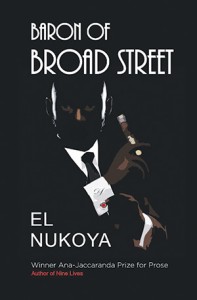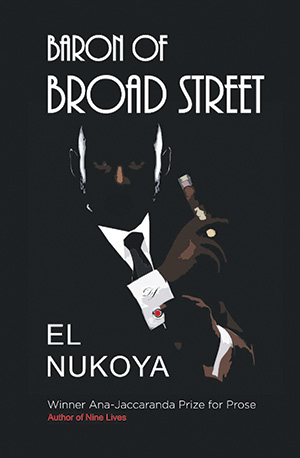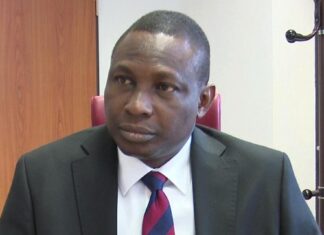El Nukoya’s latest book, The Baron of Broad Street, was presented to the public on August 2 in Lagos with people from all walks of life in attendance. This review by Toni Kan reproduced here was presented at the event.
On Tuesday July 21, 2015, a man named Edgar Lawrence Doctorow passed away in New York. He was aged 84.
 El Nukoya never met EL Doctorow. But a cursory consideration of El Nukoya’s two books – his award winning debut, Nine Lives, and his recently released Baron of Broad Street – will indicate a similarity of sorts in their limning of history as well as real situations and places in their fictive endeavours.
El Nukoya never met EL Doctorow. But a cursory consideration of El Nukoya’s two books – his award winning debut, Nine Lives, and his recently released Baron of Broad Street – will indicate a similarity of sorts in their limning of history as well as real situations and places in their fictive endeavours.
El Doctorow was a writer who published over 20 books, novels, essays and short stories. His works mapped American history, both antiquity and contemporaneity, beginning from his first novel, Ragtime, but his works were particularly celebrated for the fact that they were both fiction and yet not, because EL Doctorow had an uncanny facility for infusing real facts, people, places and incidents into the fictive universe of his works.
In 1995, an undergraduate and newly-arrived in Lagos, I visited a lovely house in Gbagada Estate. The owner was away in America, serving a 15-year jail term for drug smuggling. But that drug smuggler had one of the best libraries I had ever seen, and his brothers, who had no love for books, were selling them off to feed. I bought six books on my first visit and one of those books was Billy Bathgate by El Doctorow.
The story is of Dutch Shultz, a violent gangster who terrorised The Bronx in his days, and the narrator is Billy Bathgate, a juggler who impresses Shultz and is drafted into mafia life. Dutch was a real person, so was Lucky Luciano who comes to stand as his godfather and so also was Thomas Dewey, the prosecutor intent on bringing Dutch Shultz down.
There are parallels between that novel and El Nukoya’s sophomore effort, Baron of Broad Street. Disun and Ige may not be real people, but think of any new generation bank and you begin to get the picture. The founders of these banks were outliers as far as Lagos high society was concerned, but banking, ambition and resilience gave them entree, and today they have become bonafide members of the Lagos elite.
Baron of Broad Street is at its core a morality tale, a good versus evil narrative that traces the story of two young and indigent boys growing up in Makoko where, on the cusp of manhood, they both make a pact to, as we say in Lagos, make it and become part of the life across the swamps.
We’ve got to make it, Ige said, without any obvious correlation to any of their previous or ongoing discussions. We’ve got to find a way out of these dumps. (p.136)
What lies across the swamps, away from the dumps, is Lagos Island, genteel, elitist, snobbish and way out of their league.
Disun gets a glimpse every now and again when he goes with his father to tend the lawns of the Rogers where he is befriended by the children, Deroju and Koye. Well, that is until their mother appears one day and forbids him from interacting with her children.
“All I am saying is that I do not want to see you talking to Deroju again. Period. Never. The next time I observe anything like that, I will have a word with your father. You will be banished from this house.” (p.147)
Escape is their driving force; escape from squalour, poverty, lack, and a life whose soundtrack is of rats causing a racket.
Now, every escape is a journey and every journey requires a map. They find their map in the pages of a novel, The Count of Monte Cristo by Alex Dumas and his co-author, Auguste Maquet.
The guiding principle for them becomes the quote from the novel: Life is a storm, my young friend, what makes you a man is what you do when that storm comes. You will look into that storm and shout as you did in Rome. Do your worst, for I will do mine. Then the fates will know you as we know you.
Having internalised these words, Disun and Ige set out to make it in Lagos, but while Ige chooses to make it by any means necessary, including criminal and illegal means in America, Disun stays home and decides to tread the path of honour but with the same goal in mind.
As they embark on their separate journeys to the top, one seemingly fuelled by greed and the other by ambition, what remains abundantly clear is that as the author writes, there is a very thin line between greed and ambition, and the higher you climb on this hierarchy, the harder it becomes to recognise this line. (p.195)
And that is the line that leads invariably to destruction as we find out at the very end.
I did mention at the beginning that Baron of Broad Street is a morality tale because it riffs on the binary of good versus evil while showing how every evil deed meets its comeuppance. Another point to make is that it is a Lagos novel, a tourist’s wet dream, almost.
El Nukoya, in writing about Broad Street, outlines that business precinct with very broad strokes with easily identifiable landmarks rearing up in your vision as you read; from the Cathedral to the NPA building from Idumota to Sandgross, he maps the city with words in place of the cartographers’ lines.
Describing Broad Street and its peculiar hustle and bustle, El Nukoya writes in a particularly startling turn of phrase. The atmosphere was always charged, and the distinct whiffs of perspiration, prosperity and promise clung to every cubic inch. (p.151)
El Nukoya has a way with words, an almost sensual way of communicating the moment and he can also be given to moments of philosophical introspection. When we first meet Abeni aka Benny, El Nukoya tells us that at 18, Abeni’s figure resembled an amplified hour glass (p.60) and when Disun changes routes and heads for Broad Street, the author writes that “By the time the Oyingbo bus stop pavilion came into sight, the small idea playing in his head had become a monster”. (p.111)
There is also that moment where the preternaturally smart Ige asks his friend, Disun: “Why do you think old men are always described as wise?” And not waiting for an answer, Ige says “Simple; everyone eventually gets it. Ihe only problem is that by then, it is often too late.” (p.98)
Bankers will not like this novel because it casts a harsh searchlight on their activities, and Nigerian banking and what we see is not pleasing. But is it true? I worked in banking for six years, so while some of the characterisation and stereotypes may suffer from the Mussolini effect, where they loom larger than reality, I can say that El Nukoya is spot on in many respects.
There is however what one might consider a slight oversight. Can a man be so intent on success he forgets love because what is success really for a man if there is no woman to woo and win?
Ige has his American staff /inamorata, but Disun runs through life without as much as a little romantic dalliance, not at Makoko, not at the bank or at UNILAG. Yes, there is the attraction to Abeni as well as Deroju, but that is almost all it remains, an attraction.
To conclude, there are three lessons to be learned from this novel.
One, is the reinforcement of that mobster credo revenge is a dish best served cold.
Ige and Disun’s plans to make it can be described as revenge, such as we find at the heart of Alexandre Dumas’ novel, The Count of Monte Cristo. Their greed, ambition and emergence at the pinnacle of Lagos society are driven by an overriding need to exact revenge against society; a society that had cast them to the fringes, a society that left them as dregs, a society that had confined them to the basest rungs of the ladder.
The second lesson is that as El Nukoya writes, extraordinary wealth and morality hardly ever mix. (p.1971). For as Obafemi Awolowo is alleged to have remarked, behind every huge fortune is a huge crime.
The final lesson is that a bad editor can cost us the enjoyment of a good book and this is almost the fate of Baron of Broad Street which is an absolutely compelling story, one that will keep you glued to its pages as a morality tale that shows us the limits of ambition.
But the lax editing in the first edition is already being fixed and the paperback will be without the snafus.
• Toni Kan is Lagos-based writer and PR practitioner.











